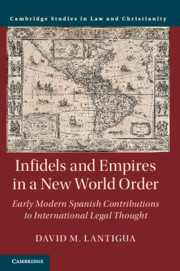‘In this beautifully written and exhaustively researched book, David Lantigua demonstrates the importance of sixteenth-century Spanish theological debates about the conquest of the New World for the subsequent development of international order and international law. Lantigua expertly reconstructs these debates, culminating in the Valladolid junta where Sepúlveda and Las Casas debated the justice of subjugating infidels for the purpose of spreading the Christian faith. In doing so, he uncovers theological arguments both for and against imperial conquest that would profoundly shape European thought and practice for centuries to come.’
Luke Glanville - author of Sharing Responsibility: The History and Future of Protection from Atrocities
‘For long, the emergence of modern international relations has been seen essentially a universal, secular affair. Yet the first Western community with global aspirations was the Catholic Church and the earliest, and for some time the most influential, theorists of international relations and international law were the theologians. David Lantigua has written a powerfully compelling, wide-ranging and immensely erudite account of how these men, in particular the Dominicans of the so-called ‘School of Salamanca’, in their struggle to understand, legitimate and control the spread of Christianity through empire, raised so many of the intellectual concerns that still determine how we think about our global inter-connected world.’
Anthony Pagden - author of The Burdens of Empire: 1539 to the Present
‘The dark truth about conceptions of human rights is that they have been used both to include and to exclude those deemed worthy of membership in the human family. Infidels and Empires in a New World Order exposes the ways in which theological understandings of the distinct rights of infidels within Latin Christendom provided a key - and inadequately recognized - conceptual model for the rights of native peoples in the New World, sometimes in order to legitimate their political dispossession, but also, importantly, in order to defend their religious and political freedom over against imperial ambitions. In shifting our attention away from the Peace of Westphalia to theological debates that took place more than a century earlier at Valladolid, Lantigua’s study makes a vital contribution to a more adequate understanding of the complex character of early modern international law.
Jennifer A. Herdt - author of Forming Humanity: Redeeming the German Bildung Tradition
‘… Lantigua’s excellent book offers a productive and stimulating new reading of numerous well-known texts. The quality of the research and analysis is superb, and the resulting interpretation enlightening. Infidels and Empires will be indispensable for those interested in the intellectual history of early modern European debates on non-Christians’ political status within a global community of humankind, and the important role these discussions played in the evolution of ideas about international order.’
Andrew W. Devereux
Source: Journal of Church and State
‘Infidels and Empires is a volume that returns to a classic theme and develops it with a vision of its own and an original perspective that includes firm legal knowledge and exhaustive theological scholarship … a particularly interesting’.
Jose Javier Ruiz Ibanez
Source: Hispanic American Historical Review
‘… Lantigua’s story of the Spanish protest is a magnificent one, told with effective detail. It halted the public policy of one nation and challenged the terms on which all Europe understood itself … Lantigua has thrown into highest relief the achievement of a concerted theological movement of moral and intellectual passion.’
Oliver O’Donovan
Source: Studies in Christian Ethics
'… His book has much to offer by way of intellectual historical analysis, moral theological reflection and political theoretical engagement. It is impeccably argued for with great conceptual depths and historical sensitivity. It is a must for any student, scholar or committed layperson, who is interested in questions about international legal thought, intellectual history and the legacy of empire.'
Camilla Boisen
Source: Global Intellectual History





